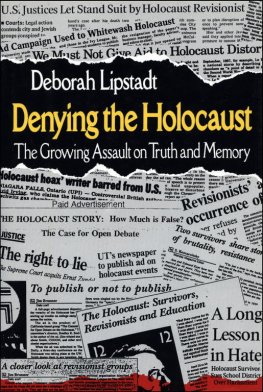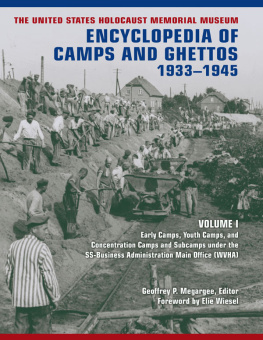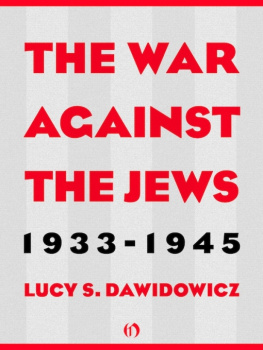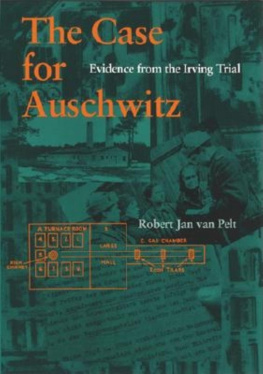Thank you for purchasing The Free Press eBook.
Sign up for our newsletter and receive special offers, access to bonus content, and info on the latest new releases and other great eBooks from Free Press and Simon & Schuster.
C LICK H ERE T O S IGN U P
or visit us online to sign up at
eBookNews.SimonandSchuster.com

CONTENTS

To my Father, of blessed memory, and my Mother
ACKNOWLEDGMENTS

This book has its roots in a challenge hurled at me by a student a number of years ago. I had just told my class that during the Nazi years, detailed information regarding the destruction of European Jewry was available to the Allies. It was no secret, I proclaimed. From amidst the mass of students came an almost angry voice: But what did the publicnot just the people in high placesknow? How much of this information reached them? Could my parents, who read the paper every day, have known? I began to argue that given all the public declarations, international conferences, and government-authorized information which was released they could have known a great deal. Furthermore, I contended, we had reporters in Germany until America entered the war. They transmitted information on Nazism, and that certainly contained information regarding the persecution of the Jews. No, my student responded, I cant believe people could have read about all this in their daily papers. Rather than let the class degenerate into a debating match, I determined that I would prove to my skeptical studentand he probably was not the only onethat I was right. Now, a number of years, numerous students, and many long hours of research later, I wish I could find that angry voice and say, I was right but so were you. Therefore, first and foremost, I thank that student who prompted me to examine this issue. His name now eludes me, but his voice still rings in my ears.
I sincerely appreciate the assistance rendered me by the archival and library staffs at the National Archives and Records Center, American Jewish Archives, American Jewish Historical Society, YIVO Institute for Jewish Research, Franklin D. Roosevelt Library at Hyde Park, Manuscript Division of the Library of Congress, Mass Communications History Center of the State Historical Society of Wisconsin, University of Washington Library, UCLA Research Library, and Yad Vashem. The National Foundation for Jewish Culture, the University of Washington Scholarly Development Fund, and the Academic Senate of UCLA all provided essential financial support.
In the course of my work a number of students and research assistants have been of critical aid to me. They assisted in the tedious task of reading microfilm and aging copies of newspapers and magazines and participated in other ways in this work. My thanks to Jon Schwarz, John Fox, Judith Israel, Arlene Becker Azose, Dorothy Becker, Cindy Fein Straus, Michael Daniels, Melanie Karp, Margaret Hanley, and Esther Leah Weil, all of whom played an important role. A number of other people helped in various ways. The editorial suggestions, technical support, and sage advice of Ann Appelbaum, Bill Aron, Cynthia Chapman, Grace Cohen Grossman, Anne Roberts, Janet Hadda, Bonnie Fetterman, Ahavia Scheindlin, Barb Shurin, and Gerald Warburg were crucial elements in different aspects of the work. Arnold J. Band not only offered critically important editorial suggestions but also pointed out that I had neglected to do the obvious. I am thankful to Fredelle Spiegel for her comments on an early version of the manuscript and for saying the right thing at precisely the right moment.
My editor Laura Wolff, of The Free Press, has been both exacting and supportive. I value her advice and assistance greatly. Eileen DeWald, also of The Free Press, was responsible for the successful production of this book. Her competence, diligence, and good humor were significant factors in ensuring its timely appearance. Hunt Cole performed a herculean task in the editing of the manuscript. My debt to Sandra E. Smith is enormous. Without her assistance the preparation of this manuscript would have been far more onerous and tedious. She played a vital role in this project.
I have been blessed to have a set of friendsboth here in Los Angeles and in a number of other placeswho provided emotional and material support, who nurtured and nourished me and helped me through many difficult moments. They tolerated my erratic schedule and my single-mindedness and were there for me when I needed them. They are like family. My family has always had a deep and abiding faith in me. They have rejoiced in my accomplishments and by so doing have given me the strength to strive to do even more. To thank either my family or my friends seems both superfluous and inadequate.

Introduction Shaping the News
The basis of our governments being the opinion of the people, the very first object should be to keep that right; and were it left to me to decide whether we should have a government without newspapers, or newspapers without a government, I should not hesitate a moment to prefer the latter .
Thomas Jefferson
In America, the President reigns for four years, but Journalism governs forever .
Oscar Wilde
I believe that in ninety-nine cases out of a hundred, the American people will make the right decisionif and when they are in possession of the essential facts about any given issue .
Adlai Stevenson

During the 1930s and 1940s America could have saved thousands and maybe even hundreds of thousands of Jews but did not do so. This is a terrible indictment which carries a heavy burden of responsibility and also raises some difficult questions: If more could have been done, why was it not done? Why were certain rescue options deliberately ignored? And most important, who
It is possible that Washingtons behavior would have been different if the American public had demanded that this country not stand idly by while innocent human beings were destroyed, but throughout the period, whenever it came to rescue, particularly when the victims were Jews, the public favored inaction over action. How can we explain such behavior? Was this a function of callousness or prejudice? Was it a matter of other priorities? Or is it possible that the American public did not really know the full extent of the tragedy underway in Europe? The President knew, the State Department knew, but did the public know? Did it have access to the details? As this study will demonstrate, an astonishing amount of information was available long before the end of the war. There was practically no aspect of the Nazi horrors which was not publicly known in some detail long before the camps were opened in 1945. Can we say therefore that there was no real secret, that there should have been no doubts? Can we assume that Americans firmly knew and consciously chose not to express concern or pressure their representatives to act? No, for it is not enough to say that what was happening was known; we must evaluate how the information was presented to the public.
Next page
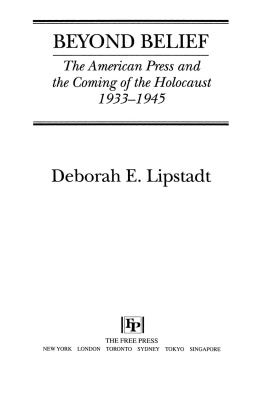
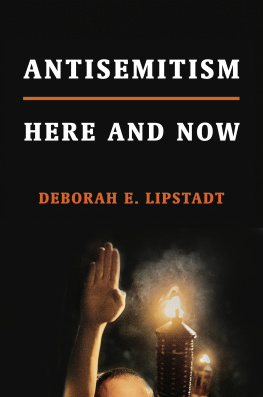
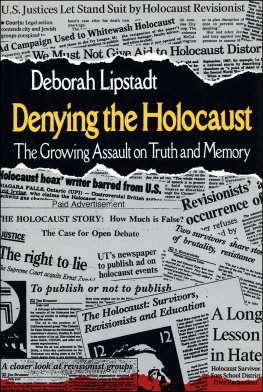
![Deborah E. Lipstadt - Denial [Movie Tie-in]: Holocaust History on Trial](/uploads/posts/book/373085/thumbs/deborah-e-lipstadt-denial-movie-tie-in.jpg)

